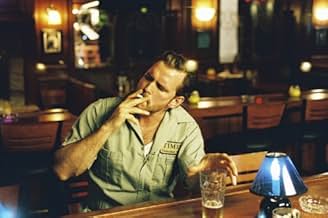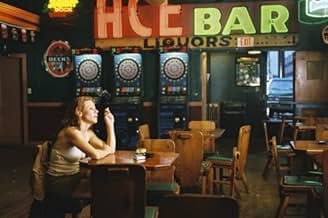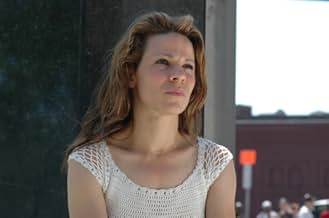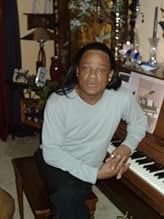Füge eine Handlung in deiner Sprache hinzuThis drama centers on Hank Chinaski, the fictional alter-ego of "Factotum" author Charles Bukowski, who wanders around Los Angeles, CA trying to live off jobs which don't interfere with his ... Alles lesenThis drama centers on Hank Chinaski, the fictional alter-ego of "Factotum" author Charles Bukowski, who wanders around Los Angeles, CA trying to live off jobs which don't interfere with his primary interest, which is writing. Along the way, he fends off the distractions offered b... Alles lesenThis drama centers on Hank Chinaski, the fictional alter-ego of "Factotum" author Charles Bukowski, who wanders around Los Angeles, CA trying to live off jobs which don't interfere with his primary interest, which is writing. Along the way, he fends off the distractions offered by women, drinking and gambling.
- Regie
- Drehbuch
- Hauptbesetzung
- Auszeichnungen
- 4 Gewinne & 5 Nominierungen insgesamt
- Tony Endicott
- (as Tom Lyons)
- Stripper
- (as Emily 'Sophia Simone' Hynnek)
Empfohlene Bewertungen
Those episodes are all we get, and apart from brief writing and longer romantic interludes, they mainly concern a long round of short-lived jobs -- sorting pickles in a pickle factory, boxing brake shoes, dusting statues, driving a cab (a hard-on's no danger to the driver, the instructor says, but sneezing is), assembling bike parts, and so on, from which Hank is unfailingly soon fired for drunkenness or lateness, insubordination or other misdemeanors -- whereupon he goes back to writing, drinking, and sex -- which latter, Jan tells him, is no good when he gets successful as he does for a while playing the horses. (There's none of the post office sorting job Bukowski did for a long time.) For Bukowski and his alter ego being a seedy loser is a thing carried off with such chutzpah that it's sexy -- and drinking and sex are equally close ways to feed the libido. There are plenty of the ten-cent aphorisms the tireless writer worked at, and there's a plug for the Black Sparrow Press that eventually started to keep and publish his endlessly mailed out submissions and today still survives off maintaining the slob genius' ovre in public hands.
Bokowski appeals to the young, the easily impressed, the hard drinking, and those who like the pithy sayings and ignore the arrested development. For those of bourgeois mentality and upbringing there's a certain imperishably tonic thrill in watching a man who's been down so long it looks like up; who can tell the employer who's just fired him to give him his severance check immediately so he can hurry up and get drunk; for whom no flophouse or flat is too seedy, no bibulous girlfriend a worse drunk than he. How liberating it might be not to care about losing everything, knowing that since paper and pen are nearly free you'll never stop writing: or if you lose heart for a minute or two, a dip into the works of some other writer will encourage you in the belief that you can do better. Bokowski was a tough one.
Matt Dillon is Irish enough to have seen something of the hard drinking life himself. One senses that he knows whereof he speaks and can convey the alcoholic lifestyle without irony or melodrama. There's nothing quite like Lili Taylor coming out in her underwear to fix Hank a meal. His request is for another round of pancakes. "There's still no butter," she says. "Well, they'll be extra crisp," he replies.
In a smaller but still choice role Marisa Tomei is well disguised as another drunken lady Hank goes home with, finding that she lives with a flaky French millionaire called Pierre (Didier Flamand) with a little yacht and dreams of composing an opera. Hank's been taken off so many two bit jobs being fired has no sting left for him. Bukowski's persona is impenetrable and he's a simple survivor: he's almost utterly resistant to the forces of change his wayward lifestyle would activate in lesser beings and hence, unlike the downward spiraling drunk so movingly played by Nick Cage in Leaving Las Vegas, Bukowski's Hank in Dillon's performance cannot build toward pathos or true depth. As suggested, this film doesn't develop its sequences and relationships as thoroughly as Barfly, for which Bukowski himself wrote the screenplay, giving it a continuity and focus Factotum's more cobbled-together script doesn't quite muster.
There's something condescending and cultish in the European cultivation of the Bukowski myth in which this is another short chapter. Factotum is an occasionally amusing, at moments laugh-out-loud kind of movie that's well served by all the principals and by director Hamer's dry wit and restraint, but after the desultory and boring stretches have eventually started to pile up you may begin to say: So what? and wish the fresh novel feel of the early scenes could've been better sustained throughout. Not to fault the editing, but mightn't a native's keener ear for the rhythms of the dialogue have kept the flow going better? This is one to see if you like Matt Dillon or Bukowski; otherwise, save your time.
Dillon doesn't look like Bukowski at all but he did honor him in this movie and this you can see in his walking, his soft and low voice and his whole attitude through the movie. It is hard to portray Bukowski's life in a movie but I remember particularly the scenes where you see Dillon dropping his writings in the mailbox, having bad jobs and being homeless, all of which was a big part of Bukowski's life before he reached fame and made decent money.
They even took the time to show a little about Bukowski's relationship with his father (whoever has read Ham on Rye could think that Buk's father in real life could have behave like the one in the movie (a despotic and acid man)
Also memorable were his thoughts on writing and writers. The movie gave me the same feeling I get when I read Ch B. poetry or novels, but this is only my experience. I do trust the feelings and I think that this movie was done with respect and love for this writer and all what he went through before being discovered.
The dialog has lots of pop. Somewhat a film noir, somewhat a comic book, the film has a nice feel with the first person narration of Chinaski taking us on his tour. It could have been in black and white but is nicely filmed in color. One of those slightly rare movies as at home at a film festival (Cleveland's, in this case) or at your local theater.
What may scare most fans away from this though, is pretty face Matt Dillon. He does not have the personality, understanding or the looks to match Chinaski. This is the main hindrance of this movie. Lili Taylor and Marisa Tomei comes better off, giving solid performances.
If you're a fan of Buk, go check it out. If you're a fan of good cinema, check it out as well. Bent Hamer is a man of vision.
Chinaski, played by Matt Dillon, is the ultimate, irresponsible goof-off, living just above the level of skid row, who gets work when he needs cash for booze etc, but invariably gets fired within days or weeks. Told not to smoke in a particular workplace, he lights up once the boss is out of the way; asked to make a delivery, he drives the van away while it's still connected to an electric plug, leaves the van door open and drifts into a bar. Even outside work, he behaves perversely - notably leaving ointment on his private parts overnight, when he's been told that one hour is the absolute limit! And Chinaski, though initially appearing mildly passive, is not averse to violence, even to women.
The man's sole redeeming features are his belief in himself as a writer, and his persistence in writing and submitting his work. (His main redeeming feature should be his actual talent for writing, but the film gives us little evidence of this, except for a few Bukowski quotes, which in any case are mainly about his belief in himself.) .
Dillon fits this role like a glove. By turns, he sleepwalks, staggers and rampages through the movie - that is, when Chinaski isn't drinking in bars or sleeping it off with or without a woman. And, because this is fiction rather than biography, Dillon can mitigate his deplorable behaviour and slovenly dress simply with his good looks and dark eyes. One suspects that in real life Bukowski was far less likable than his cinematic alter ego.
Chinaski's main squeeze for most of the movie, bravely and quite unglamorously portrayed by Lili Taylor, is Jan who shares her lover's fondness for alcohol and a slacker life. In one sequence, when he has split from Jan, Chinaski encounters a glossier woman, Laura (Marisa Tomei), who introduces him to a more bourgeois world; but this doesn't last long, and he soon reverts to his usual round of drink and casual jobs. (Incidentally, I found the sound quality in the whole Marisa Tomei sequence quite poor, and missed much of the dialogue.)
I'm not too sure what anybody uninterested in Bukowski (or Matt Dillon) will make of this movie; but if you're looking for somjething in English other than blockbusters, rom-coms, costume dramas etc - this is it. And, whatever your view of the movie, if you haven't already done so, read some Bukowski - you'll love it!
Wusstest du schon
- WissenswertesOn 14 April 2005, in Trondheim, Norway, this became the first movie in the world to be shown with a 4K digital cinema projector.
- PatzerThe title screen displays: "factotum [a man who preforms many jobs]"--should be "performs many jobs".
- Zitate
[last lines]
Henry Chinaski: [voiceover] If you're going to try, go all the way. Otherwise don't even start. This could mean losing girlfriends, wives, relatives, jobs, and maybe your mind. It could mean not eating for three or four days. It could mean freezing on a park bench. It could mean jail. It could mean derision. It could mean mockery, isolation. Isolation is the gift. All the others are a test of your endurance. Of how much you really want to do it. And you'll do it, despite rejection in the worst odds. And it will be better than anything else you can imagine. If you're going to try, go all the way. There is no other feeling like that. You will be alone with the gods. And the nights will flame with fire. You will ride life straight to perfect laughter. It's the only good fight there is.
- SoundtracksI Wish to Weep
Lyrics by Charles Bukowski
Music by Kristin Asbjørnsen
Performed by Dadafon
Mixed by Magnus Torkildsen at Barracuda
Top-Auswahl
- How long is Factotum?Powered by Alexa
Details
- Erscheinungsdatum
- Herkunftsländer
- Sprache
- Auch bekannt als
- Factotum: A Man Who Performs Many Jobs
- Drehorte
- Produktionsfirmen
- Weitere beteiligte Unternehmen bei IMDbPro anzeigen
Box Office
- Budget
- 1.000.000 $ (geschätzt)
- Bruttoertrag in den USA und Kanada
- 808.221 $
- Eröffnungswochenende in den USA und in Kanada
- 59.212 $
- 20. Aug. 2006
- Weltweiter Bruttoertrag
- 2.708.087 $
- Laufzeit1 Stunde 34 Minuten
- Farbe
- Sound-Mix
- Seitenverhältnis
- 1.85 : 1





























